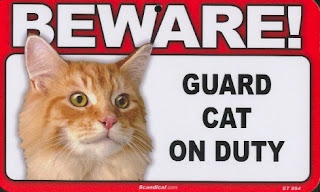 |
| Even with the assistance of Europe's finest, the EU has found it hard to keep fakes out of the single market ... |
"Large parts of the economic growth and jobs in the EU depend on the effective enforcement of intellectual property rights ... customs authorities are in a comparatively good position to enforce" [Being in a "comparatively good position" to enforce is not the same as being able to enforce, says Merpel. It's frustrating when you're in that position and the law doesn't let you do what you know must be done].The new rules contained in the draft Regulation on customs enforcement of intellectual property are due to replace Regulation 1383/2003 and would lay down procedures enabling customs authorities to stop suspected goods (on which see here). The Commission proposal extends the scope of the rules to include illegal parallel trade (trade in goods which has not been approved by the rights holder and which enters the EU through unapproved channels) and goods bearing lookalike trade marks. It also proposes that anyone receiving small postal consignments of counterfeit goods would be given the option of agreeing to their destruction without having to pay the costs of storage and destruction.
The Creutzmann report suggests that small consignments be defined as fewer than items, weighing less than two kilos and contained in one package. It also wants the customer to have a say before the goods are destroyed. The European Parliament report also expresses concern that the measures could hamper legitimate trade in generic drugs between non-EU countries and stresses that intellectual property legislation applies only to goods being delivered in the EU, not to goods transiting through Europe. Additionally it calls for a Commission analysis of the effectiveness of current customs measures aimed at combating trade in falsified medicines.
The group of the Progressive Alliance of Socialists & Democrats in the European Parliament has tabled an amendment which would exclude goods covered by patents and supplementary protection certificates from the scope of customs enforcement of intellectual property rights. This proposal, were it to be accepted, would be extremely detrimental to Europe's knowledge-based economy, this Kat understands, since a significant proportion of border detentions relate to patent-protected goods (for some useful statistics on this subject, click here).
A major katpat to Marius Schneider (Eeman & Partners, Brussels) for providing this momentous news.
 Reviewed by Jeremy
on
Monday, July 02, 2012
Rating:
Reviewed by Jeremy
on
Monday, July 02, 2012
Rating:



![[Guest post] Can AI be considered a PHOSITA? Policy debates in the US and the EU](https://blogger.googleusercontent.com/img/b/R29vZ2xl/AVvXsEggxDO6mW5r4n3-06Af5ckmIaMIhzgPJBoDP8AUsSYXY2zajUQt1ObGVn_GhCgidbG_YDVnybQuJ5XoAjjBG9Ws2xJWDQHNPMrLkn526SWIG371X_Kjt1E8tJmn8Ae_20Phyphenhyphen09JeuUOhhTR3aZE9lMRQlqHGQGcAWGxlo91rrKcLk0AfUjWCvw6RQ/s72-c/Two-cats-eating.jpg)












I must take issue with the final comment here - it is stated that a significant proportion of border detentions relate to patent-protected goods. If you look at the 2010 figures you will see that 0.44% of detained articles related to potential patent infringement.
ReplyDeleteThis legislation was aimed at counterfeit and pirate materials, which relates to trade mark and copyright issues. Customs officials are not in a position to analyze complex issues of patent infringement and their inclusion in this regulation only serves to leave them open to abuse.
Here Here!!
ReplyDeleteLet's leave patents out of this.
If I don't want to be fircated in a bifurcated system where it will take years to determine whether there were grounds for me to be fircated: I certainly don't want to be fircated on entry into Europe by a customs official who has no means of detection whether or not my product is a pukka product or a counterfeit product.
Although the 0.44% of articles that were detained on "suspicion" of patent infringement is an interesting statistic, what would be more interesting would be the proportion of those where the detention was found proper after an infringement action.
The 2010 report on EU enforcement contains more interesting statistics.
It seems that over 50% of border control cases came from just two countries Germany and UK [roughly equal numbers]. In contrast, to reach 50% of detained articles you need to combine [in descending order] Greece, Italy, Spain and either Netherlands or Portugal.
Clearly either the geographical concentration of active IP attorneys is higher than the the geographical concentration of counterfeiters; or German and UK counterfeiters import smaller numbers of articles than their colleagues elsewhere in Europe.
What we need for European balance is more efficient importers of counterfeit goods in UK and Germany.
0.44% of detained articles might not be large in terms of numbers of items detained, while yet being a very considerable proportion in terms of the value of the goods in question -- pharma products for example. And it must be particularly attractive to import and sell fake or infringing pharma products in those countries which haven't approved them for their public health services on account of their cost.
ReplyDelete@ Anon 11:51:
ReplyDeleteThere are other laws available to deal with unauthorised sales of substances of possibly questionable composition as medicines -- as indeed there need to be, because many such "medicines" may be either off-patent or never patented at all.
That's why it my indeed be more relevant to look at this Regulation in the context of something like the mobile-telephone patent wars; and to take care that Customs aren't empowered to jump in mob-handed in any circumstances where it is unclear that a court would necessarily agree to an injunction.
In the mobile devices field there have indeed been cases of Customs seizures of new products before trade shows to prevent their demonstration and trade launches, on the basis of competitors' allegations of patent infringement, where the patents in question have subsequently been found either invalid or not infringed.
ACTA: I did not find room for a comment except here: there is a vote on ACTA in the European Parliament on the day after tomorrow, Tuesday 3 July, between 12:30 and 14:30.
ReplyDeleteKind regards,
George Brock-Nannestad